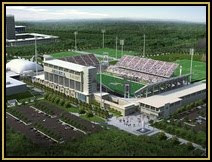 University at Albany Athletic Director Lee McElroy hung a sign on his office door last month that proclaims, "Optimism Reigns Here."
University at Albany Athletic Director Lee McElroy hung a sign on his office door last month that proclaims, "Optimism Reigns Here."
That was McElroy's response to the state Legislature killing $36.5 million in proposed funding for the new campus football stadium he has championed.
"I just wanted to let our people know we're fine," he said.
For McElroy to make a strong statement without uttering a word is typical of his firm yet understated management style, according to those who work with him.
McElroy, who is black, learned leadership at an early age as the oldest in a family of 12 children in segregated Beaumont, Texas. He's applied those lessons to help UAlbany grow from its infancy as an NCAA Division I athletic program.
"Lee is the principal reason the program has developed the way it has," said UAlbany Interim President George Philip. "He had a real vision for the program and he understands the concept of a student-athlete."
UAlbany joined Division I in 1999 amid skepticism that the school could be successful. During McElroy's eight years, the Great Danes have won 28 conference championships and made 13 NCAA Tournament appearances.
UAlbany doesn't compete at the highest level of Division I and isn't expected to. McElroy is in charge of a $13 million athletic budget, a fraction of the money spent by powerhouse programs such as Florida and UCLA.
That doesn't mean McElroy lacks ambition. He is tackling his remaining priorities: replacing the outdated football stadium and convincing former UAlbany athletes to donate more money to the program.
McElroy, 60, said he relates to Division I student-athletes because he was one himself.
He received a football scholarship from UCLA, which he said saved him from a career working in one of the oil refineries in Beaumont. That's where most of the classmates from his all-black high school ended up.
"I would have still been there," McElroy said. "Given what the refineries are doing to your lungs, I probably wouldn't have been alive ... . There weren't a lot of other options for a person of color."
McElroy graduated from UCLA in 1970 with a degree in political science and history. He taught in the public school system in Santa Monica, Calif., and served as a high school principal in Beaumont. He got his first job in college sports in 1981 as associate director of athletics at the University of Houston.
The night of his high school graduation, McElroy flew to Los Angeles to begin taking college classes. Being surrounded by gifted students at UCLA further fueled his ambition.
"The environment drives you to be successful," he said. "When you're in a class with people that are all motivated and intelligent, you work hard and rise to the top, or you're going to fail."
He's succeeded to be counted among the 5 percent of Division I athletic directors who are black.
McElroy said he felt tremendous pressure to succeed because he was the first child in a large family, the son of a mail carrier and a teacher's aide who stressed getting an education. He knew his six brothers and five sisters looked to him as an example.
His father told him to be the first one at the dinner table, and the other children would follow. It was his responsibility to make sure his siblings were home from school and the doors were locked for the night.
"Very early on you learned responsibility and accountability," McElroy said.
He said he asks the same from his coaches and demands they run a clean program and make sure their players graduate.
McElroy is fond of pointing out that UAlbany's athletes have a higher graduation rate (73 percent) than the general student body (63 percent).
Not that there haven't been problems.
The athletic department was rocked when three freshmen football players -- one from Texas, one from Georgia, one from Florida -- were arrested on rape charges in October 2006. Two pleaded guilty to third-degree rape.
"It was gut-wrenching," McElroy said. "I pride myself on giving kids an opportunity to succeed at the university and represent the university in a first-class manner."
Although he described the arrests as "an isolated incident," McElroy said they did spur a positive change. He implemented a program to ensure out-of-state freshmen receive greater supervision from coaches, older teammates and academic advisors.
McElroy also has left his imprint on UAlbany's coaching staff; only five coaches in UAlbany's 19-sport program remain from prior to his tenure.
However, those who work under McElroy say he takes a hands-off approach.
UAlbany men's basketball coach, Will Brown, said if McElroy calls, it's usually to offer support after a big win or tough loss, or to see if there's anything he can do for the program.
"He's not one of those micromanagers you have to clear everything through," Brown said. "He trusts my judgment."
Football coach Bob Ford, who has been at the school since 1970, said McElroy has given him more full-time assistant coaches and renovated the team's locker room.
"He's created an environment where you've got a fighting chance of succeeding," Ford said.
McElroy has an open-door policy and tries to meet with every recruit who comes on campus, as well as his or her parents.
As McElroy walked down to the SEFCU Arena court recently, sophomore volleyball player Kate Eckhardt stopped him to pass on a greeting from one of her professors. The rest of the volleyball team came over to say hello. Coaches say he knows each of the school's hundreds of athletes by name.
"He can recall conversations he had five years earlier with kids and their parents," said former UAlbany volleyball coach Kelly Sheffield, hired last month by Dayton.
Four decades after his playing career, McElroy remains an imposing presence. The former linebacker is 6-foot-3, broad-shouldered and fit from working out six days a week at a YMCA near his home in Slingerlands.
UAlbany Deputy Athletic Director Rick Coe called McElroy a "calming influence" who encourages his employees to speak up with ideas. When the football stadium proposal was nixed, McElroy called a staff meeting to reassure the staff.
Philip, who served on the search committee that first interviewed McElroy, says he is an unassuming man who would be fun to hang out with.
"He's genuine," Philip said. "He's a regular guy. He doesn't put on airs. He's easy to talk to."
That McElroy will be remembered for building UAlbany's Division I program is ironic, given that some peers warned him not to take the job because they sensed the school wasn't committed to being successful.
But McElroy, who previously was athletic director at American University in Washington, D.C., said he accepted the post because of its uniqueness and the persuasion of then-president Karen Hitchcock.
Last year, McElroy signed a five-year contract extension worth $220,000 annually.
"For me, anyway, you're going to get more pleasure and you're going to have a better experience building something from scratch and seeing it grow," he said.
McElroy, who is married, said he doesn't know whether this will be his final professional stop. But before he goes anywhere, he wants to build that football stadium.
Courtesy: Mark Singelais
Monday, May 5, 2008
For University of Albany's Athletic Director, Lee McElroy, Optimism Abounds: UAlbany Athletics
Posted by
BRE
at
8:55 AM
![]()
Labels: Dr. Lee McElroy, UAlbany sports, University of Albany
Subscribe to:
Post Comments (Atom)

.jpg)




.jpg)
+(2).jpg)
.jpg)
.jpg)

.jpg)
+(2).jpg)
+(2).jpg)
+(2).jpg)
_(2)+(2).jpg)
+(2).jpg)
+(2).jpg)
_(2)+(2).jpg)
+(2).jpg)


.jpg)
.jpg)
+(2).png)
+(2).jpg)
.jpg)
.jpg)
+(2).jpg)
+(2).jpg)
+(2).jpg)
.jpg)
+(2).jpg)
+(2).jpg)
+(2).jpg)
_(2)+(2).jpg)
+(2).jpg)
.jpg)
+(2).jpg)
+(2).jpg)
+(2).jpg)
.jpg)
.jpg)
+(2).png)
.jpg)
.jpg)
.jpg)
.jpg)
+(2).jpg)
+(2).jpg)

.jpg)

+(2).jpg)
.jpg)
.jpg)
.jpg)
.jpg)
.jpg)
.jpg)
.jpg)
.jpg)
.jpg)
.jpg)
.jpg)
.jpg)
.jpg)
.jpg)
.jpg)
.png)
.png)
.jpg)
.jpg)
.jpg)
.jpg)
.jpg)
.jpg)
+(2).jpg)
.jpg)
+(2).jpg)
.jpg)
+(2).jpg)
.jpg)
.jpg)
.jpg)
.jpg)
.jpg)
.jpg)
.jpg)
.jpg)
.jpg)
.jpg)
.jpg)
.jpg)
.jpg)
.jpg)
.jpg)
.jpg)
.jpg)
.jpg)
.jpg)
.jpg)
.jpg)
.jpg)
.jpg)
.jpg)
.jpg)
.jpg)
.jpg)
.jpg)
.jpg)
.jpg)
.jpg)
.jpg)
.jpg)
.jpg)




No comments:
Post a Comment